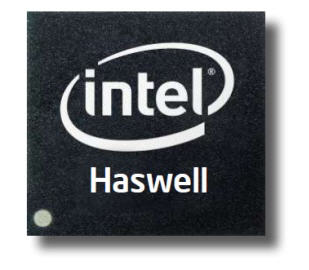Supposed Intel i7-3770K vs. i7-4770K Benchmarks Leaked
Some Benchmarks have been leaked where the i7-3770K has been pitted against the upcoming i7-4770K.
A user over at the Coolaler forums has leaked some benchmarks of the Core i7-4770K; it compares them against what we're most interested in, its predecessor, the i7-3770K.
The i7-4770K will be a quad-core part with HyperThreading, resulting in eight threads. It will have a base clock frequency of 3.5 GHz and a boost clock of 3.9 GHz. There will be 8 MB of cache, HD 4600 "GT2" graphics iGPU, and a Thermal Design Power (TDP) of 84 Watts, seven more than the current i7-3770K. Earlier, it was leaked that the chip would cost about $327.
While the benchmarks aren't necessarily reliable, based on the rumors regarding Haswell's performance, they do not seem out of line. It remains a leak though, so do take it all with a grain of salt.
CPUMark99:
- Core i7-3770K: 613 Points
- Core i7-4770K: 676 Points
SuperPI 1M:
- Core i7-3770K: 9.344 Seconds
- Core i7-4770K: 9.220 Seconds
SuperPI 32M:
- Core i7-3770K: 8:38.717 Minutes
- Core i7-4770K: 8:15.059 Minutes
Cinebench R11.5
Get Tom's Hardware's best news and in-depth reviews, straight to your inbox.
- Core i7-3770K: 7.87 Points
- Core i7-4770K: 8.55 Points
Overall, we can see that the CPU shows an increase in performance between 5 and 10 percent. Again, following the rumors from earlier, this doesn't come as a massive surprise. It mainly verifies what we already knew.
Coolaler also mentioned that, while Haswell will be very nice for overclocking, it still suffers from the same temperature problems that Ivy Bridge does, although perhaps not to as great an extent.
Niels Broekhuijsen is a Contributing Writer for Tom's Hardware US. He reviews cases, water cooling and pc builds.
-
ssdpro "Coolaler also mentioned that, while Haswell will be very nice for overclocking, it still suffers from the same temperature problems that Ivy Bridge does, although perhaps not to as great an extent"Reply
This was an over-baked Ivy issue anyway. As a 2600k and 3770k user I never found 3770k to be wildly hotter at all. Clock for clock, yes, it is a bit warmer - few degrees C. Something to worry about or a reason to avoid as some did, not at all. Is the chip "suffering"? That is just clown stuff. -
Augray37 so an 8-10% increase in performance? not good, not bad, about what i expected. but these are 4 benchmarks only, and i'm guessing the 4770k used was an engineering sample? what i really want to see is how well they OC.Reply -
darkchazz I upgraded from Phenom II X4 955 to i7 3770K in June last year. One of the best purchases I have made, next to my Crucial M4 SSD.Reply
The performance jump was unbelievable. It also draws much less power and runs cooler. The phenom bottlenecked my gtx670 even when overclocked to 4ghz.
-
icrf I'm actually most interested in something that utilizes AVX2. I have high hopes that x264 can incorporate them and have gains well in excess of 10%.Reply -
Augray37 Reply10721151 said:I upgraded from Phenom II X4 955 to i7 3770K in June last year. One of the best purchases I have made, next to my Crucial M4 SSD.
The performance jump was unbelievable. It also draws much less power and runs cooler. The phenom bottlenecked my gtx670 even when overclocked to 4ghz.
hmm...that's weird, the gtx 670 didn't bottleneck my phenom ii x4 955 much at all really, not noticeably so. i was playing bf3 ultra at 1080p with no real lag at all. don't remember the fps exactly, but it rarely dipped into the 30s if i remember correctly. -
redeemer So these gains are from architectural changes or updated optimization coding that Intell pumps into these benchmark softwares?Reply -
crisan_tiberiu well, since SB the TIC-TOC strategy was forgot :) since SB we have TIC-TIC. The only thing that we forget is that intel cand aford this, they are far ahead...Reply

